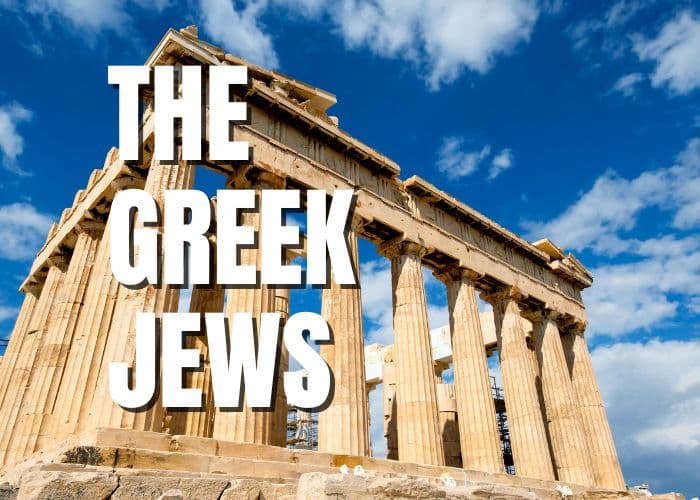Greek Jews: A Rich History, Vibrant Communities, and a Unique Culture
Greek Jews have a long and rich history that spans over two thousand years, from ancient times to the present day. They have made significant contributions to the culture, history, and society of Greece, and their legacy is still felt today. In this article, we will explore the history, communities, culture, religious liturgy, and notable people and accomplishments of Greek Jews.
- History of Greek Jews
The history of Greek Jews dates back to the Hellenistic period, when Jews began to settle in Greece. During the Roman era, Jews were spread throughout Greece, and many became part of the urban elite. In the Middle Ages, the Jewish community in Greece thrived, and Greek Jews played a significant role in the cultural and economic life of the country.
During the Ottoman Empire, Greek Jews enjoyed relative prosperity and lived in peace with their Muslim and Christian neighbors. However, during World War II, the Greek Jewish community suffered a devastating loss. The Nazis occupied Greece and deported over 80% of the Jewish population to concentration camps, where they were murdered. After the war, the Jewish community in Greece struggled to rebuild itself, and many Greek Jews emigrated to Israel, the United States, and other countries.
- Communities Today
Today, the Jewish community in Greece is small but vibrant, with an estimated population of around 5,000. The community is centered in Athens and Thessaloniki, and there are also small communities in other parts of the country.
Despite its small size, the Jewish community in Greece is active and has a strong presence in Greek society. The community is involved in various cultural and social activities, and there are several Jewish organizations in Greece that promote Jewish culture, history, and heritage.
- Culture (including music and cuisine)
Greek Jewish culture is a unique blend of Jewish and Greek traditions. Greek Jews have preserved many of the traditions and customs of their ancestors, including music, cuisine, and language.
Greek Jewish music is an important part of the community’s cultural heritage. Greek Jews have their own distinct musical style, which is characterized by a mix of Greek and Jewish elements. The music is often played at weddings, festivals, and other special occasions.
Greek Jewish cuisine is also a unique blend of Jewish and Greek traditions. The cuisine is influenced by the Mediterranean diet and includes dishes such as dolmades (stuffed grape leaves), moussaka, and feta cheese. Traditional Greek Jewish dishes include matzah, spanakopita (spinach pie), and avgolemono soup (egg and lemon soup).
- Religious Liturgy
Greek Jews practice a form of Judaism that is heavily influenced by Sephardic traditions. The liturgy is conducted in Ladino, a language that is a mix of Hebrew, Spanish, and Turkish.
The main Jewish holidays are celebrated in Greece, including Passover, Hanukkah, and Yom Kippur. The Greek Jewish community also celebrates the festival of Purim, which is not widely celebrated in other Sephardic communities.
- Notable People and Accomplishments
Greek Jews have made significant contributions to Greek society and culture over the centuries. Some notable figures include:
- Albert Cohen: A French-language Swiss writer who was born in Corfu and spent his early years in Greece.
- David A. Straz Jr.: A prominent businessman and philanthropist who has donated millions of dollars to various Greek causes.
- Erika Mordecai: A prominent journalist and author who has written extensively about the history and culture of Greek Jews.
- Samuel David Luzzatto: A prominent rabbi and scholar who was born in Trieste, Italy, and spent many years in Greece.
Conclusion
In conclusion, the Greek Jewish community has a long and rich history, filled with challenges and triumphs. Despite facing persecution and displacement throughout the centuries, they have managed to maintain a vibrant and resilient culture, characterized by unique traditions, music, and cuisine.
Today, the community is small but still active, with a strong presence in Athens and Thessaloniki, as well as in other parts of the world, including Israel and the United States. While the population has dwindled, efforts are being made to preserve and revitalize the community’s rich cultural heritage, through initiatives such as language and music education programs.
The religious and cultural traditions of Greek Jews are also noteworthy, including their unique liturgy and the important role of the synagogue in the community. Notable individuals, such as the philosopher Abraham ibn Ezra and the poet Samuel David Luzzatto, have also contributed greatly to Jewish intellectual and literary history.
Overall, the Greek Jewish community serves as a testament to the resilience of Jewish culture and the enduring strength of the Jewish people. Their history and culture are a rich tapestry of tradition and innovation, and their contributions to the broader Jewish and global communities are significant and lasting.








Ohr HaChaim Yomi – Emor